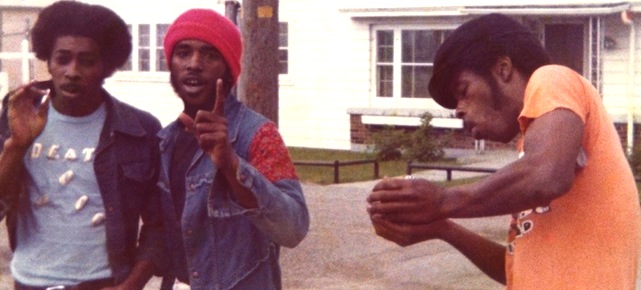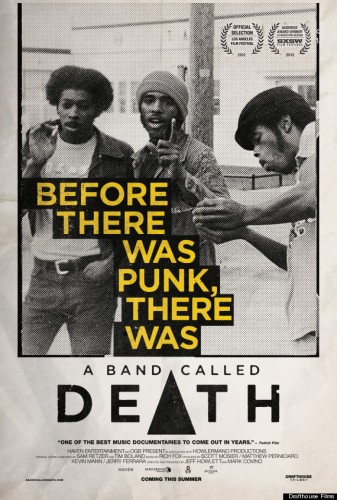
This comes courtesy of our consummate musician-journalist, Sam Bush.
[youtube=http://www.youtube.com/watch?v=RDPDm9_nX0o&w=600]
When you think of “punk music” what exactly comes to mind? Skinny white kids in leather jackets? Iconic album covers like The Ramones or London Calling? Maybe you don’t have a clue as to what “punk music” is and maybe you don’t care. I, personally, don’t know a thing about punk music except that it’s music for rebels and that that is cool. But when I recently learned that one of the first visionaries of punk music was a band of three Christian black guys, all blood-brothers from Detroit, and that the name of their band was Death, all of my punk preconceptions were smashed to bits, like Paul Simonon’s bass guitar if you will. The documentary A Band Called Death (available to stream on Netflix) tells a gem of a story about a band who did everything they weren’t supposed to. How punk is that?
Bobby, Dannis and David Hackney grew up in Detroit in the early 70s during the legendary Motown era. Their childhood home was full of music except, unlike the other families in the neighborhood who were all spinning Earth, Wind and Fire records, the boys were raised on Queen, Jimi Hendrix, Bob Seger and Alice Cooper. They specifically remember when their father, a Baptist minister, sat them down to listen to The Beatles. From the very beginning the Hackney brothers were swimming against a cultural current, playing white man’s music in a black man’s world, and they couldn’t have cared less! Their parents instilled in them an unwavering devotion to one another – the family motto, repeated constantly by their mother, was “Back up your brother!” So when David came home after his first concert experience, seeing The Who at The Fillmore, and vowed to only play “pure rock ‘n roll,” Bobby and Dannis had no choice but to follow his vision. Practicing every day between 3-6PM, with their amps turned up and the windows down, the boys played their hearts out. And they were good.
 If that’s not edgy enough for you, the boys’ music was fueled by two things: Christianity and the concept of, you guessed it, Death. After their father was tragically killed by a drunk driver, David, the lead guitarist and main visionary of the group, became obsessed with spirituality. Rather than using religion as a means of escape though, David saw Christianity as something that zeroed in on his mortality. Shortly after their dad’s funeral, David brought his brothers together to announce their new band name: Death. In a recorded conversation from the band’s early days, David asks Dannis, “What do you think the ultimate trip is?” to which Dannis replies, “I would say, ‘Doing what you want to do.'” In a serious, thoughtful tone, David responds, “Ok. What if I told you that the ultimate trip… was death?” Thus the band’s identity was solidified. Now, more than ever, they were concerned only with what was real. Their consensus: what’s more real than death?
If that’s not edgy enough for you, the boys’ music was fueled by two things: Christianity and the concept of, you guessed it, Death. After their father was tragically killed by a drunk driver, David, the lead guitarist and main visionary of the group, became obsessed with spirituality. Rather than using religion as a means of escape though, David saw Christianity as something that zeroed in on his mortality. Shortly after their dad’s funeral, David brought his brothers together to announce their new band name: Death. In a recorded conversation from the band’s early days, David asks Dannis, “What do you think the ultimate trip is?” to which Dannis replies, “I would say, ‘Doing what you want to do.'” In a serious, thoughtful tone, David responds, “Ok. What if I told you that the ultimate trip… was death?” Thus the band’s identity was solidified. Now, more than ever, they were concerned only with what was real. Their consensus: what’s more real than death?
Opening a yellow pages book to the Music Industry section, nailing it to the wall and throwing a dart at it, David decided that the first publishing company they would visit would be Groovesville Productions. After hearing the band’s home recordings and having them audition live in-studio, Brian Spears, the director of Publishing, agreed to sign them. “The moment that that band fired up those instruments it was just amazing,” Spears said. “It was amazing to me to see such young players have so much to say through their music.” Seemingly destined for stardom, Death were given Groovesville’s stamp of approval on one condition: they had to change their name. No matter how talented they were, no matter how inspired, nobody was going to buy a record of a band called Death. Other record labels had the same response. The band could change their name and likely be catapulted into fame and success or keep their name and remain on the margins of the Detroit music scene. Despite his brothers’ pleading, David was convinced that if they gave up the name, they might as well give up everything. It was that important to him. Family motto in mind (“Back up your brother!”), Bobby and Dannis agreed and the band turned the deal down. Soon after, they were released by Groovesville Productions.
I’ll leave a little room for mystery, but I must say that the rest of the documentary will not disappoint! There’s passion and heartache; sorrow and redemption. The band was Spirit-driven in a way that left the rest of the world and myself completely dumbstruck. (In the press release of their first album, David said, “This album is all about God and Christ” to which a local newspaper responded in a review of the album with the headline “Rock ‘n Roll Please And Hold the Religion.”) But what makes this story so beautiful is that this band’s fixation on death is not simply an idea or a tool to rebel against conformity. It’s painfully real! The Hackney brothers experience death in just about every form imaginable – ideologically, financially, emotionally and physically. Only long after their band’s death (the death of Death) does any resurrection take place. And what a real, beautiful and unexpected resurrection it is.
Before you head straight to Netflix, I’ll quote Bobby Hackney while remembering his brother’s motives behind naming the band Death: “David wanted to put a positive spin on death. It’s like birth!” Well, if David Hackney is right, if death is actually the only way to life and if it really is the ultimate trip that we will all someday take, then why not name your band after it? After all, “He who believes in me will live, even though he dies; and whoever lives and believes in me will never die.”
[youtube=http://www.youtube.com/watch?v=uAZ9R2t5Jd0&w=600]

COMMENTS
4 responses to “A Band Called Death: What Three Brothers From Detroit Can Teach Us about the Ultimate Trip”
Leave a Reply













This article reminds me of my teen years as an atypical Black youth. In the 1990’s, while my peers were listening to the likes of Dr Dre, Snoop Dogg, and Tupac, I was heavily immersed in punk rock. I can in many ways relate to the story of these young men. What I find fascinating is that not only were they Black guys making ground-breaking, ahead-of-their-time punk music, but that they also apparently infused Christian themes into their music and it looks like they did so unashamedly. One of my favorite bands during the season of life when I was into punk was Bad Brains. They also were ahead of their time and were very influential on the hardcore punk scene. In a culture where religion and specifically Christianity are eschewed, Bad Brains were unashamed about their Coptic/Rasta beliefs. They would openly sing (scream) about reading the Holy Bible and about “spiritual” themes. It’s interesting how both Death and Bad Brains were able to not defy the “racial paradigm”, but how they also brought to punk music the spiritual/Biblical themes to a subculture that traditionally rejects such notions and worldviews. As a Black man who formerly was into the punk culture and who now fully embraces Christianity, as the Gang of Four say on their first album, “I find that essence rare…”
Great comment.
Thanks for this! My wife and I just watched the film and we absolutely loved it. It’s always good to see stories of men who stick to their guns no matter what life may throw their way, and to see God’s providence blessing them with such a cool story is very refreshing indeed.
Now I have a new thing to remind my son when and if he gets a younger brother: “Back up your brother!”
FWIW, you can get the 2009 re-release of Death’s debut from the erstwhile Drag City: http://www.dragcity.com/products/for-the-whole-world-to-see